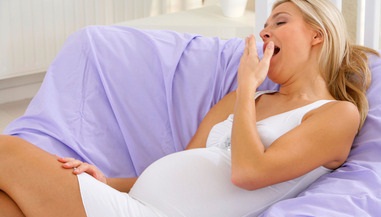It's completely normal to feel tired when you're pregnant, especially in your first few weeks and towards the end of your pregnancy when getting a full night's sleep might not be easy.
When you're pregnant, huge changes take place in virtually every system in your body, which can make you feel extremely tired. Even if you're usually a night owl, you may find staying awake for a film, or even a 30-minute series, virtually impossible now that you're pregnant.
Throughout pregnancy, but especially in the first trimester, your body works tremendously hard. You're making the placenta, which is your baby's life-support system. Your hormone levels and metabolism are rapidly changing, while your blood sugar and blood pressure levels tend to lower. This all contributes to your sense of constant fatigue.
When is tiredness a sign of something else?
Tiredness and low energy levels can sometimes be a symptom of anaemia, which is not uncommon in pregnancy. Your doctor will check your blood for anaemia during your first antenatal visit and later on in pregnancy, as part of your routine blood tests.
Being tired and run-down can make you feel low. But occasionally, being exhausted and having trouble sleeping can also be symptoms of depression. If you have feelings of hopelessness and have lost interest in the things you used to enjoy, speak to your doctor.
How long will my tiredness last?
It's different for every mum-to-be, but you are most likely to experience fatigue in your first and third trimesters. So you may be struggling with exhaustion before you've even told other people that you're pregnant.
In your first trimester, fatigue is often one of the symptoms of morning sickness, along with nausea, loss of appetite and sometimes vomiting.
If your symptoms are disturbing your sleep, you'll feel even more tired and irritable. Try to get as much rest as you can, because fatigue can make nausea and vomiting much worse.
You may find that your morning sickness eases at about 14 weeks to 16 weeks of your pregnancy. But varying levels of nausea can last until 20 weeks, or even longer, for some women.
You'll probably lose steam again sometime around 28 weeks. By this time, your bump will be getting bigger and it may be harder for you to get comfortable in bed and get a good night's sleep. And the extra weight you are carrying can make you feel tired during the day.
However, it's not the same for every woman. You may feel tired all through your pregnancy, or you may hardly slow down at all.

What can I do to cope with tiredness?
Listen to your body's signals
Try taking naps or have an early night. You'll need more sleep in early pregnancy, so rest and get plenty of sleep whenever you can.
At work, even a 15-minute nap can make a difference, so if you're lucky enough to have a ladies’ room or an office door, close it, put your head down on your desk and rest. If you have a car, try and have a nap in your lunch hour in your car if there's nowhere else for you to sleep. If you are at home, make time to sit with your feet up during the day.
Adjust your schedule
You could reduce your hours at work, or if that's not possible, perhaps adjust the hours when you work.
If you're already a mum, give yourself a break now and then and leave your children with someone else, so you can catch up on your sleep. If you live in a joint family, ask for help and support from your family members. If you are a nuclear family, ask your family and friends for support, and accept offers of help.
Eat well
A healthy diet can help you to keep your energy levels up. Include a variety of fruit and vegetables, as well as good sources of iron, protein and calcium.
Eating well while you're feeling sick isn't easy. If you can't take down much in one go, try to eat little but more often, as having an empty stomach can make you feel even more nauseous and tired. Try having a cold meal or several healthy snacks through the day.
Do some gentle exercise
Even if exercise is the last thing you feel like doing, go for a walk or a swim. It can make you feel better, and help you to sleep at night.
Hang in there...
...because you'll soon be in your second trimester and hopefully feeling much better again. If you're in your third trimester, you can take comfort in knowing that your pregnancy will soon be over, although you may find that you're more tired with a newborn in the house than what you are now with your big baby bump!
Rest assured that feeling tired won't harm you or your baby. But do try to get as much rest as you can, whenever you can.








